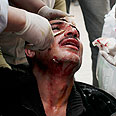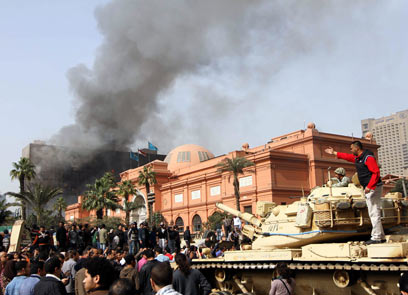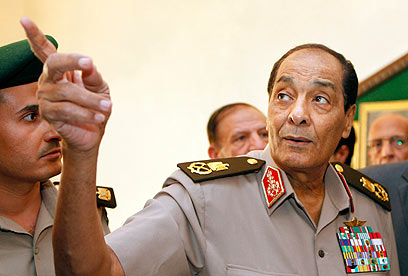
Report: Egypt army ordered to operate on protesters without anesthetic
Additional details from report submitted to President Morsi reveal military officers' involvement in atrocities committed during revolution; senior military doctor ordered subordinates to operate on wounded protesters without anesthetic or sterilization, it claims
A day before former Egyptian President Hosni Mubarak goes on trial for the second time on charges of complicity in the murder of protesters during the uprising that unseated him, an investigation commissioned by President Mohamed Morsi claims senior Egyptian army doctors were ordered to operate without anesthetic on wounded protesters at a military hospital in Cairo.
The findings, which relate to the army's behavior during the Abbassiya clashes in May 2012, are the latest leak to British newspaper The Guardian of a suppressed report investigating human rights abuses in Egypt since the start of the 2011 uprising that toppled Mubarak. Earlier leaks alleged that the military were involved in torture, killings and forced disappearances during the uprising.
Related stories:
- Morsi withdraws complaints against media
- Egypt's Christian pope blasts Morsi
- Egypt's hangman: Gallows was my dream
The report also alleges that doctors, soldiers and medics assaulted protesters inside the hospital.
The new chapter leaked to The Guardian contains testimony from doctors and protesters about the treatment of injured demonstrators at the Kobri el-Qoba military hospital in Cairo in May 2012.
It alleges that a senior military doctor ordered subordinates to operate on wounded protesters without anesthetic or sterilization and reports that doctors, nurses and senior officers also beat some of the wounded protesters. It also claims that a senior officer ordered soldiers to lock protesters in a basement.

Protests in Cairo (Archive photo: AFP)
The chapter concludes by recommending an investigation into the highest echelons of the army leadership – a "deeply significant development," according to the British newspaper. The report was submitted to Morsi in January, but it has not been officially released yet.
The Guardian said the report represents the first acknowledgment by the state of the scale of the atrocities both during and since the 2011 uprising.

Former Defense Minister Hussein Tantawi (Archive photo: AFP)
"I can't overestimate the importance of this report," Heba Morayef, the director of Human Rights Watch in Egypt, told the newspaper. "It's incredibly important. Until today, there has been no official state acknowledgement of excessive force on the part of the police or military. The army always said they took the side of protesters and never fired a bullet against them. This report is the first time that there has been any official condemnation of the military's responsibility for torture, killing, or disappearances."
According to a doctor on duty at the hospital, whose identity was withheld in the report, "Military doctors, soldiers and medics inside the hospital assaulted protesters by severely beating them and verbally assaulting them."

Mubarak during the first trial (Archive photo: AP)
He also described how another senior military officer "ordered doctors not to give any sorts of anesthetic during treatment or stitching. He also ordered that their wounds should not be cleaned."
The live televised retrial for Mubarak, the ailing 84-year-old former autocrat who toppled by mass protests in 2011, is likely to highlight the stumbling nature of Egypt's path to transitional justice.
The highest appeals court ordered a retrial in January after accepting appeals from both the defense and the prosecution. Each cited different shortcomings with a trial that ended with life prison terms for Mubarak and his interior minister but was criticized for the weak evidence offered by the prosecution.
Mubarak, former interior minister Habib al-Adli and four top aides are charged with involvement in the killing of more than 800 protesters who died in the 18-day uprising. Mubarak's two sons, Gamal and Alaa, face retrial on charges of financial corruption.
Mubarak's imprisonment last June was a historic moment; he was the first ruler toppled by the Arab Spring uprisings to stand trial in person.
Reuters contributed to the report
- Receive Ynetnews updates directly to your desktop










